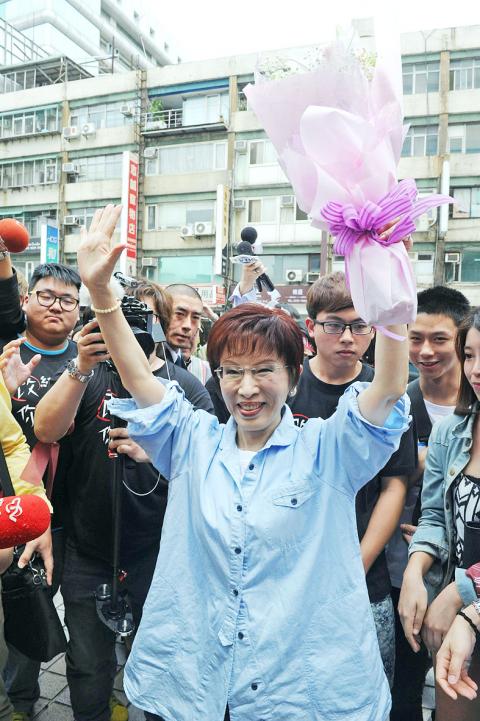Deputy Legislative Speaker Hung Hsiu-chu (洪秀柱) yesterday signed up to participate in the Chinese Nationalist Party’s (KMT) primary for its presidential candidate, becoming the first person to do so after the nomination process began.
More than 100 of Hung’s supporters gathered outside the KMT’s headquarters as Hung went through the process of acquiring an application form.
“Give me Hung Hsiu-chiu, pillar of tomorrow,” chanted her supporters. The word “pillar” is an allusion to the last character of her name in Chinese.

Photo: CNA
Addressing the crowd, Hung said that the battle had begun.
“Changes start today,” she said. “I would have every bone in my body smashed in exchange for the nation walking on the right path.”
She also pledged to take part in the primary, which she described as a fair and open election process under a democratic mechanism.
“Without this process, there will only be closed-door negotiations,” which Hung said she would never accept.
Hung is the only KMT member so far to come forward, while other hopefuls, including Vice President Wu Den-yih (吳敦義) and Legislative Speaker Wang Jin-pyng (王金平) have remained tight-lipped about their intentions.
Asked if he would also be taking an application form, Wang yesterday said: “I don’t know now ... later,” while giving his support to Hung.
New Taipei City Mayor and KMT Chairman Eric Chu (朱立倫) — who is widely seen as the KMT’s best chance of winning the presidential election next year — has made it clear on several occasions that he has no plans to enter the race.
Some KMT supporters remain hopeful that Chu might change his mind if enough people come forward to persuade him to run for the presidency.
The KMT started the nomination process to select a presidential candidate yesterday. Interested party members need to submit an application form and collect supporting signatures from 5 percent of KMT members to register as a candidate.
The hopefuls have 27 days to complete the process, with candidate registrations taking place on May 17 and May 18.
The candidate is to be selected by a combination of opinion polls and a vote by party members. The average from two polls is to account for 70 percent of the final result and the party members’ vote, to be held on June 14, would make up the remaining 30 percent.
The KMT has more than 300,000 members, so potential candidates need to collect 15,000 signatures each to reach the next stage of the selection process.
The KMT is to nominate its presidential candidate at a party convention in mid-July.
The Democratic Progressive Party on Wednesday last week nominated Chairperson Tsai Ing-wen (蔡英文) as its presidential candidate.
The Central Election Commission last month selected Jan. 16 next year as the date for the presidential and legislative elections.

Intelligence agents have recorded 510,000 instances of “controversial information” being spread online by the Chinese Communist Party (CCP) so far this year, the National Security Bureau (NSB) said in a report yesterday, as it warned of artificial intelligence (AI) being employed to generate destabilizing misinformation. The bureau submitted a written report to the Legislative Yuan in preparation for National Security Bureau Director-General Tsai Ming-yen’s (蔡明彥) appearance before the Foreign Affairs and National Defense Committee today. The CCP has been using cognitive warfare to divide Taiwanese society by commenting on controversial issues such as Taiwan Semiconductor Manufacturing Co’s (TSMC, 台積電) investments in the

INVESTIGATION: The case is the latest instance of a DPP figure being implicated in an espionage network accused of allegedly leaking information to Chinese intelligence Democratic Progressive Party (DPP) member Ho Jen-chieh (何仁傑) was detained and held incommunicado yesterday on suspicion of spying for China during his tenure as assistant to then-minister of foreign affairs Joseph Wu (吳釗燮). The Taipei District Prosecutors’ Office said Ho was implicated during its investigation into alleged spying activities by former Presidential Office consultant Wu Shang-yu (吳尚雨). Prosecutors said there is reason to believe Ho breached the National Security Act (國家安全法) by leaking classified Ministry of Foreign Affairs information to Chinese intelligence. Following interrogation, prosecutors petitioned the Taipei District Court to detain Ho, citing concerns over potential collusion or tampering of evidence. The

‘COMPREHENSIVE PLAN’: Lin Chia-lung said that the government was ready to talk about a variety of issues, including investment in and purchases from the US The National Stabilization Fund (NSF) yesterday announced that it would step in to staunch stock market losses for the ninth time in the nation’s history. An NSF board meeting, originally scheduled for Monday next week, was moved to yesterday after stocks plummeted in the wake of US President Donald Trump’s announcement of 32 percent tariffs on Taiwan on Wednesday last week. Board members voted to support the stock market with the NT$500 billion (US$15.15 billion) fund, with injections of funds to begin as soon as today. The NSF in 2000 injected NT$120 billion to stabilize stocks, the most ever. The lowest amount it

NEGOTIATIONS: Taiwan has good relations with Washington and the outlook for the negotiations looks promising, Minister of Economic Affairs J.W. Kuo said Taiwan’s GDP growth this year is expected to decrease by 0.43 to 1.61 percentage points due to the effects of US tariffs, National Development Council (NDC) Minister Paul Liu (劉鏡清) said at a meeting of the legislature’s Economics Committee in Taipei yesterday, citing a preliminary estimate by a private research institution. Taiwan’s economy would be significantly affected by the 32 percent “reciprocal” tariffs slapped by the US, which took effect yesterday, Liu said, adding that GDP growth could fall below 3 percent and potentially even dip below 2 percent to 1.53 percent this year. The council has commissioned another institution